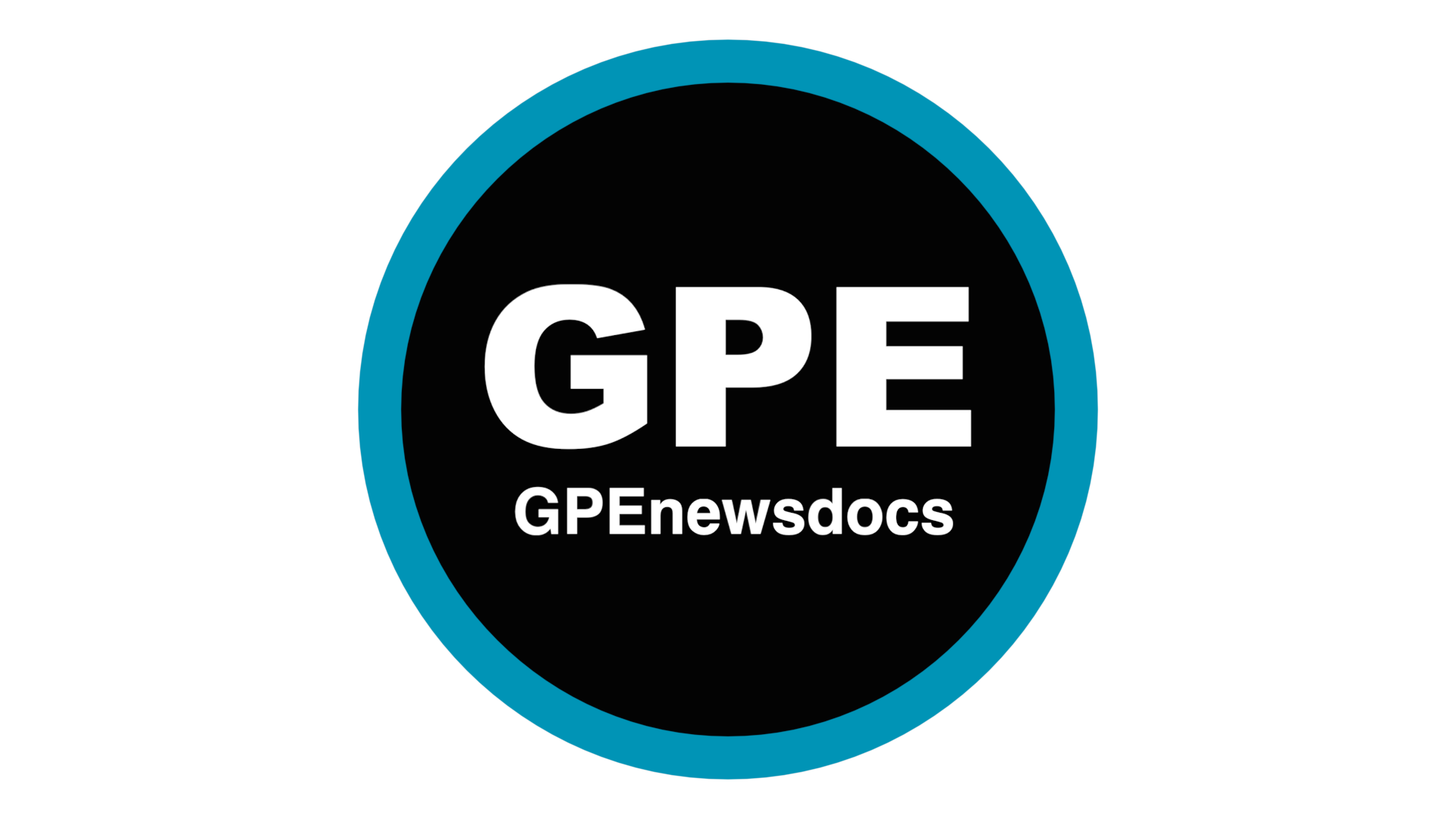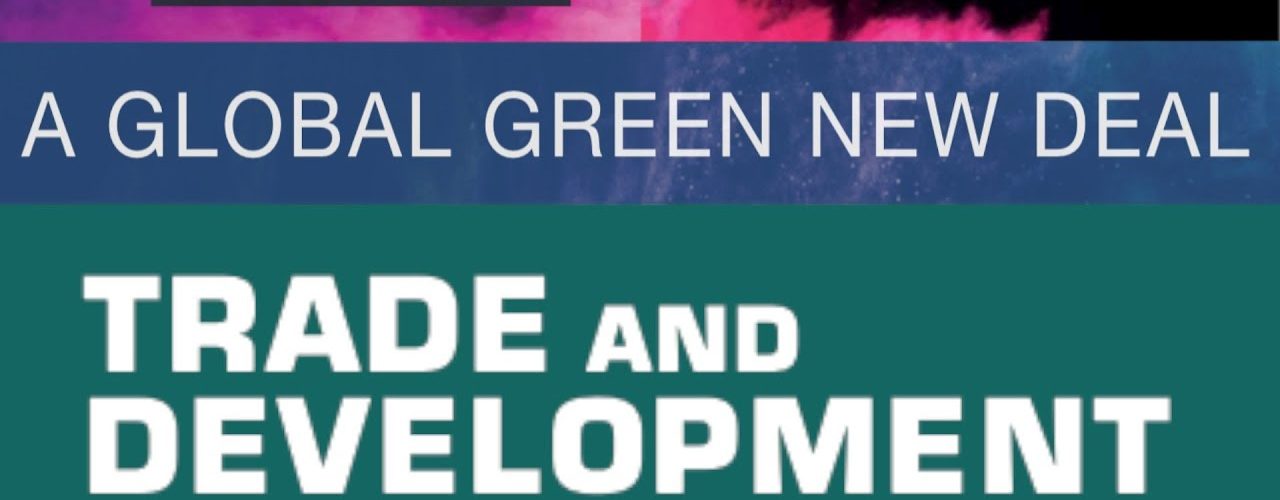Richard Kozul-Wright, chief economist of UNCTAD, explains what a Global Green New Deal is about: end austerity, redistribute income, change the credit system and implement a massive investment program. None of that is going to be delivered by the pro-business hyper-globalization game .
December 11, 2019 Produced by Lynn Fries / GPEnewsdocs
TRANSCRIPT
LYNN FRIES: Welcome to this report from GPEnewsdocs. I’m Lynn Fries. Everyone’s increasingly anxious on two fronts in particular: economic and environmental. And the real challenge is to find solutions that address these two problems simultaneously: so states Richard Kozul-Wright in launching this year’s annual Trade & Development Report or TDR.
RICHARD KOZUL-WRIGHT: Just ask yourself, or look, how did the advanced economies pay for the fight against fascism? The United States entered World War II with four planes and a battleship and 10 guys with guns on the Delaware River. I mean, they were massively under militarized. Yet within four years, they had created the largest army in the world, a highly sophisticated military, aircraft, seafaring fleet. And they didn’t do that by talking about public private partnerships. I can tell you that. Roosevelt did not go to Henry Ford and say: Can you help me pay for the war, Henry? They did not go to the private sector. They used the mechanisms available to the public sector to generate huge investments to meet the challenges of the day. And essentially that, I think, is what needs to be done – in both developed and developing countries – if the challenges of the 2030 Agenda and the climate challenge are going to be met.
LYNN FRIES: Welcome to this report from GPEnewsdocs. I’m Lynn Fries. Everyone’s increasingly anxious on two fronts in particular: economics and the environment. And the real challenge is to find solutions to these two problems simultaneously. So states RKW in launching this year’s annual Trade & Development Report TDR.
The 2019 Trade & Development Report provides solutions to problems detailed in the 2017 & the 2018 TDR forming a trilogy of reports with RKW as lead author. Kozul-Wright is UNCTAD’s Chief Economist and UNCTAD Director of Globalization & Development Strategies. This newsdoc features a meeting at the UN Geneva as delegates of UN Member States are being briefed on the 2019 Trade and Development Report by Richard Kozul-Wright. We go now to our featured clips.
RICHARD KOZUL-WRIGHT: If you want to be kept awake at night, you should all read the book by David Wallace. Wells called the uninhabitable earth. Which is the, which is, which goes through the damage to the environment that has already taken place on the back of what is relatively a minor rise in global temperatures. And if we take the IPCC seriously, anything above two degrees is going to lead to catastrophic economic challenges. At two degrees C, I think IPCC estimates something in the order of $70 trillion of damage. Once you get to three degrees centigrade above or four degrees, which is where we would end up if we continued on our current growth path, then you’re talking in the order of hundreds of trillions of dollars in terms of damage from climate change by the, by the end of the century.
We know that. I think we all know that. No one’s going to dispute that. The point that I think is critical to our story is if we’re going to deal with those challenges that are being generated by a warming world and we’re going to address the 2030 agenda as well, then we have to have a massive investment push. The only way to solve these problems is through large scale investment. I think everybody acknowledges that. Investments in these interconnected public goods are the only way to solve the challenge. And we in UNCTAD have put a figure of $2 to $3 trillion on that. Some of you might have heard that Bernie Sanders, in his recent pronouncements of a Green New Deal for the United States has put the figure of $16 trillion over the next 10 years in terms of delivering on what he thinks are the necessary components of a Green New Deal. We’re talking about, as the World Bank says, from billions to trillions of dollars a year in the kinds of investments needed to address the imbalances and breakdowns that we see linked to climate and to economic failures of one kind or another. So, no, I don’t think anyone disputes that.
So the question is where’s the investment going to come from? That’s the big challenge that we all face whether you’re in the advanced world or in the developing world. The big problem that we have and when we look at this challenge and, and look to think about solutions to the challenges is that the rules of the hyper-globalization game, the rules that we tried to outline in our previous two reports, have not changed since 2009 in any fundamental way. And one of the unreported features of hyper-globalization is that it does not deliver sufficient productive investment. We are living in a world of insufficient investment and have been doing for 20 years.
So despite the fact that hyper-globalization – being pro-business, cutting taxes, keeping wages low – was going to be good for investment, that’s not what the evidence shows. The evidence shows that we already live in a massively insufficiently invested in world, and that’s a big problem when you’re making an argument that in fact, we need another $6-$7 trillion a year investing in public goods to solve the kinds of problems that have been outlined in the 2030 agenda and in the IPCC Reports. So that’s, that’s a first problem.
What we hear from the international community in terms of trying to solve this problem is that basically we need to bring in the private sector. The only people with money in this world, apparently, are the private sector. So we have to somehow find the incentives, we need to incentivize private finance to deliver public goods. It’s what the World Bank calls ‘Maximizing Finance’. That’s their, that’s their story. There’s a simple problem with the story. And the simple problem is there is absolutely no evidence to support it. So when we look at the evidence about what private capital has done to deliver public goods, it’s on a minuscule basis. And when you go back longer in history, all the evidence suggests that if you want to deliver public goods, the only sector that delivers public goods is the public sector. And so what you need is properly financed public sectors if you’re going to deliver on these kinds of challenges.
On top of that, the kinds of solution, the kinds of policies that are offered to support private capital in delivering public goods, on the evidence that we’ve seen actually delivers the opposite of what you’re trying to do. It delivers more exclusivity. We’ve seen that from the financialization of the world economy over the last 30 years. So it doesn’t deliver a greater inclusion and it certainly doesn’t deliver sustainability. If there’s one thing that we know about 21st Century finance, it’s highly unstable. And it doesn’t deliver the kind of sustainability that we’re looking for.
So as a consequence of that, our argument is what we need is something much more ambitious, what we call a Global Green New Deal in the report. And that’s a deal that will reclaim the policy agenda from footloose capital; will seek to deliver economic justice for those thrown under the bus and will seek to reverse decades of environmental degradation.
What we think we need to go back to, is what Keynes in his famous letter to Roosevelt in the late 1930s wrote: What we need once again is to discover faith in the wisdom and power of government. Because that is the only way in which we turn the kinds of vicious circles that we’re in, into the virtuous circles that we think we want to need and want. And this is what the Green New Deal, as we understand it, is all about.
We think these are the basic elements of a Green New Deal: ending austerity; redistributing income has to be part of any Green New Deal. That’s not only good in terms of inclusivity; it’s good for the economy too. It boosts global demand. So ending austerity and redistribution of income is actually a source of economic growth. We need to increase public spending quite clearly in the goods and services needed to make the industrial and environmental transition. That obviously includes investments in improving the energy intensity of output – more efficient energy systems- but also requires us to shift the composition of energy away from fossil fuels to renewables. That’s a key component of any Green New Deal.
We need a progressive, direct taxation as part of the funding mechanism. And as a consequence of the greater activity that we think we can generate from these kinds of policies, you will also get a high tax base as a consequence. So in a certain sense, I think Ann [Ann Pettifor] will talk about this a little bit more, Green New deals are self- financing. They partly generate the resources you need to make the productive investments to solve the problems that you want to solve. People say, oh yeah, this is an agenda against business against private investment. No, this is an agenda that wants more private investment. It’s a crowding in agenda in which the private sector will actually invest more in the new sectors that are being created as a consequence of the shift in the growth path that is being advocated. Obviously that will, at least on our point of view, require industrial policy. Fortunately, the world is rediscovering industrial policy and the discussion of industrial policy is, once again, back on the policy agenda. And it needs to be taken much more seriously. That will be an important element of any Green New Deal.
And of course we’ll need to change the credit system. We don’t want a credit system that directs credit into financial speculation and transacting simply amongst other financial agents. We want a credit system that is able to backstop the kind of investments in the public and private sector that are needed to deliver on the Global Green New Deal. And we have a, I think, a very good chapter in the report on the reassessment of public banks as a necessary agent of a Green New Deal. And including a much more active role for central banks as a key element in reconfiguring the financial system in a way that can deliver the kinds of investments we want to see.
A final point in terms of any Green New Deal at the domestic level, policy coordination -between industrial policy, between trade policy, macro policy – has to be an important part of any consistent framework. I don’t want to go into the details, but Chapter Three of the report tries to model these kinds of policy changes. Not because we’re offering a blueprint to you in terms of particular policy measures but simply to show that if you combine a higher wages, more productive investment, increased government expenses, higher taxes you can combine that with attempts to create jobs, higher growth, and to decarbonize the economy. It’s not some sort of pie in the sky utopian model. And it’s certainly not a de-growth model. You can combine these elements with the right kind of policy mix to deliver a more inclusive and sustainable growth path.
And I think all Green New Deals – whether they’re in the United States or the UK or wherever – will have these kinds of components in them. The problem is, it’s simply not good enough for the United States and the United Kingdom and the European Union to do this. That will not solve the problem of an unequal and environmentally endangered planet. That’s not enough. Doing this for 1 in 10 of the world’s population is insufficient.
Is this back to 1944? Do we need a new Bretton woods? A lot of people talk about the need for a new Bretton Woods. And in a certain sense, the answer is yes but it depends which Bretton Woods you’re talking about. It’s good to remind ourselves what the architects of Bretton Woods wanted to do because for most of the history of Bretton Woods, this has not happened. And the best person to go to, if you want to know what Bretton Woods was about is Henry Morgenthau who was the U S Treasury Secretary at the time of the Bretton Woods and the guy that had to sell Bretton Woods to the American public. And whose team was instrumental – Harry Dexter white and others – in terms of fashioning the Bretton Woods agenda. And he had to go to the House Committee on Banking and Currency to defend the Agreement. In 1945 he went, he was about to lose his job, but he went in ‘45 and defended [the Bretton Woods Agreement].
And these are the three elements of what is a good multilateral system; these are Morganthau’s ideas of what he was trying to do: Subordinate finance to the real economy, first thing you have to have. And that includes with respect to the trading system. Morganthau knew you don’t have a healthy trading system, if you have an unhealthy financial system. And we live in a world of an unhealthy, financial system. Is it surprising we have an unhealthy find a trading system? No, certainly not to Morgenthau because that’s what he expected from an unhealthy financing system. Second point, you can’t have political independence if you don’t have economic independence. It was Morgenthau who wanted policy space as an integral part of the Bretton Woods system back in 1944. So it’s not an UNCTAD invention. It’s an American invention – policy space – and a very good one too. And you can’t have a healthy trading system if you don’t have sufficient policy space for the actors who are participating in that system. So that’s the second point. Morganthau is very clear on that. Third point, you can’t have inclusive development in a world of economic aggression and bullying. The terms, economic aggression and bullying are not my words, they are Morgenthau’s words. And that’s true, obviously, of the trading system. We know that now. You can’t have a healthy trading system in which big powers play by one set of rules and enforce a different set of rules on weaker countries. And Morgenthau was out to stop that. Now, unfortunately, I don’t think we have any of those American principles for a healthy multilateral system. And at least in terms of our understanding of what a Global Green New Deal needs, we need to get back to those basics if we’re going to deliver on the ambition and the urgency that I think is needed to pull up the people and cool down the planet. Thank you.
LYNN FRIES: We are going to have to leave it there.Special thanks to UNCTAD and thank you for watching and for your interest in this segment of GPEnewsdocs coming to you from Geneva, Switzerland as a guest contribution to Naked Capitalism at nakedcapitalism.com.
END TRANSCRIPT
Richard Kozul-Wright, Director of the Division on Globalization and Development Strategies at the United Nations Conference on Trade and Development, is the author of Transforming Economies: Making Industrial Policy Work for Growth, Jobs and Development.
Originally published at Naked Capitalism
Original content in this work by Lynn Fries/GPEnewsdocs is licensed under a Creative Commons Attribution-NonCommercial-NoDerivatives 4.0 International License. Some of the other public domain work(s) that this program incorporates may be licensed separately.



